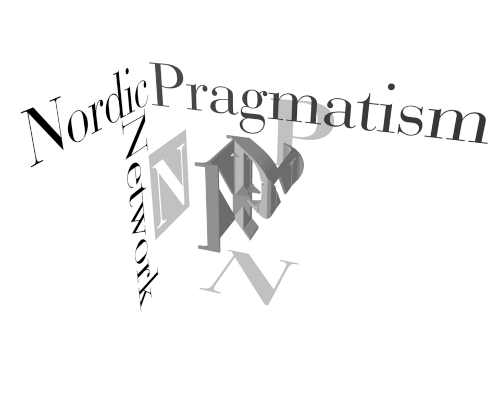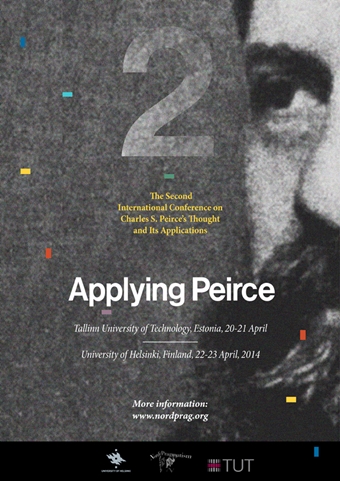Applying Peirce
The Second International Conference on Peirce's Thought and Its Applications
|
Helsinki, Finland & Tallinn, Estonia 21-23 April 2014 |
Introduction
Research in Charles Sanders Peirce’s thought has grown rapidly both within and outside the arena of philosophy on the global level. Peirce’s pioneering contributions to philosophy, pragmatism, logic, the theory of signs, philosophy of science and to numerous other fields are currently being explored not only in philosophy but also in other sciences and in art studies.The second installment of the Applying Peirce conference, first held in Helsinki in June 2007, brings together Peirce scholars and researchers to explore and discuss Peirce’s thought and applications in diverse fields.
The year 2014 marks the centenary of Peirce’s death in Milford, Pennsylvania, in 19 April 1914. The meeting takes place in the twin cities of Helsinki and Tallinn, connected by a two-hour ferry ride. The programme consists of workshops and a small selection of contributed papers.
Venue
The conference takes place at Tallinn University of Technology, Estonia (21 April) and the University of Helsinki, Finland (22-23 April).
The program begins on 21 April 2014 at 10 am in Tallinn. The conference is organized at Tallinn University of Technology (TUT), address: Akadeemia street 3; building no. X, 3rd floor, lecture room X-311. To get to Tallinn University of Technology from the city center, take trolley no 3 opposite Kaubamaja (Tallinn Department Store) or express bus no 11 (Kunstiakadeemia stop) to Keemia stop. We will organise an informal gathering in the city center on 21 morning to go together to the University.
In Helsinki, the conference takes place at the Topelia building of the University of Helsinki, address Unionionkatu 38, class C120. On 22 April, the programme in Helsinki begins at 11:30 am. The location is a 5 minute walk away from the conference hotel.
All participants arriving from Tallinn on the morning of 22 April are recommended to take the Viking Line day cruise departing from Tallinn at 8:00 and arriving in Helsinki at 10:40 am. Note that you should be boarding at least half an hour before the departure of the ferry.
The conference organizers:
- Ahti-Veikko Pietarinen (Chair)
- Mats Bergman (Co-chair)
- Henrik Rydenfelt (Secretary)
- Jean-Marie Chevalier
- Juuso-Ville Gustafsson
- Jelena Issayeva
- Erkki Kilpinen
- Marko Marila
- Amirouche Moktefi
- Jukka Nikulainen
- Sami Paavola
The conference has been sponsored by the Federation of Finnish Learned Societies and the Ragnar Nurkse School of Innovation and Governance.
Call for Papers
The organizers invite submissions on any topic in accordance to the theme of the conference. We encourage proposals that explore the applicability of Peirce’s thought to current questions and problems in various disciplines across the sciences and the arts that identify the leading edge on Peirce studies. (For a separate call on Peirce and his students see separate call below.) Suitable topics include, but are not limited to, Peirce in connection to
- history of science
- mathematics, logic, diagrams
- abductive reasoning
- communication and rhetoric
- cognitive and computing sciences
- linguistics, semiotics
- fine arts and design
- physics, biology, geology
- psychology, economics, sociology
- anthropology, archaeology
Please send an abstract of 300-500 words to info@nordprag.org by 1 February 2014 (in pdf, rtf or doc format). Notifications of acceptance will be sent by 8 February 2014. A time slot of about 30-35 minutes (including discussion) will be allotted for each paper.
Call for Papers: Peirce and His Students
Tallinn, Estonia, 21 April 2014
It has sometimes been claimed that, unlike many other classical philosophers, Charles Peirce had few or even no intellectual heirs at all. This event intends to establish the extent of relationships between Peirce and his pupils, students, collaborators, successors and inheritors – and to what extent these notions themselves also call for historical and philosophical clarification when it comes to the legacy of a great thinker.
Although having held no permanent academic position, Peirce led the Metaphysical Club and instructed a famous circle of logic and philosophy students at Johns Hopkins University. Moreover, he lectured often, developed correspondence courses, collaborated with a number of scientists, and contributed with his student Joseph Jastrow to what became the field of experimental psychology. His correspondence reveals that many were eager to learn from him, and he designed courses with attention to logic teaching and pedagogy. Thanks to the efforts of Ladd-Franklin and many others, a Peircean school of logic may have been in the making already in his lifetime. These and many other issues invite a closer investigation of Peirce’s legacy as viewed through his students.
Possible topics include:
- Peirce’s students at the Johns Hopkins University: John Dewey, Allan Marquand, Christine Ladd-Franklin, Oscar Howard Mitchell, Benjamin Ives Gilman, Joseph Jastrow, Ellery W. Davies, Thorstein Veblen, Josiah Royce, Henry Taber. How do Peirce’s teachings show up in their own careers?
- Peirce’s influence on his colleagues and collaborators; his place in academia; his own research groups
- The impact of the Metaphysical Club to the development of science and philosophy
- Students in Peirce’s correspondence; Peirce’s correspondence courses
- Schröder, Ladd-Franklin and other logicians and philosophers pursuing Peirce’s logics; the nature of the Peircean lineage in logic
- Peirce's influence on Ramsey and the Cambridge community
- Welby’s significs in comparison to Peirce’s
- The reception of pragmaticism in his lifetime
Submissions (max. one page abstract) should be sent to peirce.workshop@gmail.com by 28 February 2014. Notifications by 8 March 2014.
Organisers: Jean-Marie Chevalier (Collège de France) & Amirouche Moktefi (Tallinn University of Technology).
Programme
Tallinn, Monday, 21 April
| 10.00-13.00 |
Peirce and His Students Ahti-Veikko Pietarinen (University of Helsinki / Tallinn University of Technology) The Second Metaphysical Club and Its General Significance to the Development of American Science Kana Shindo (Meiji University, Japan) Inheritance from Peirce to Dewey: Growth as Experimental Inquiry and Creative Intelligence Neil W. Williams (University of Sheffield, UK) James’s Application of Peirce Jean-Marie Chevalier (Collège de France) Was Benjamin Ives Gilman a Peircean till His Last Days? Amirouche Moktefi (Tallinn University of Technology) The Rivalry between Peirce and his Logic Students |
| 14.00-16.00 |
Gaetano Albergo (University of Catania) Pretence, a Case of Iconism without Symbolism Tyler James Bennett (Tartu University) Peirce and the Empirical Study of Signs Tommi Vehkavaara (University of Tampere) Applicability of Peirce’s Logical Concept of Sign Sharon Morris (University College London) Peirce and the Contemporary Work of Art |
| 16.30-18.30 |
Claudia Cristalli (University of Pisa) Peirce on Perception Marc Champagne (University of York) A Peircean Semiotic Interpretation of the Sperling Results Simone Morcagni (EHESS) and Jean-Marie Chevalier (Collège de France) Perceptive Facts in a World of Values Shannon Dea (University of Waterloo) Towards A Peircean Metaphysics of Sex |
Helsinki, Tuesday, 22 April
| 11.00-11.30 | Registration and arrival from Tallinn |
| 11.30-13.30 |
Frederik Stjernfelt (University of Copenhagen Types of Theorematical Reasoning Francesco Belluci (Tallinn University of Technology) Peirce on Deduction Alexander Gerner (University of Lisbon) Enhancing Attention by the Technique of Perspective-taking in Theoric/Theorematic Body-Diagram Transformations Ahti-Veikko Pietarinen (University of Helsinki) Comments |
| 13.30-14.30 | Lunch |
| 14.30-17.00 |
Chiara Ambrosio (University College London)
Reasoning In Action: Charles S. Peirce’s History of Science Chris Campbell (University College London) Dmitri Mendeleev and Charles Sanders Peirce: A Case of Relations Break (15 minutes) Pierre-Luc Dostie Proulx (UC Louvain) Putting Peirce’s Anti-Scepticism Into Use: Considerations for Moral Epistemology Agnieszka Hensoldt (University of Opole) Peirce and the Pragmatic Theory of Information Chair and comments: Henrik Rydenfelt (University of Helsinki) |
| 17.00-17.30 | Break |
| 17.30-19.15 |
17:30-18:15 Helmut Pape (University of Bamberg) Compulsions, Forces and Assertions. Peirce on the Semiotics of Rhetorics 18:15-19:15 Jaakko Hintikka (Boston University / University of Helsinki) The Place of Peirce in the History of Logic |
| 19.15-20.00 | Wine & Cheese |
Wednesday, 23 April
| 10.00-12.30 |
Sami Paavola (University of Helsinki) Abduction Embedded in Social Interaction Donald Stanley (Maine Medical Center), with Daniel Campos (Brooklyn College) Experience in Medical Practice: Generating and Selecting Diagnoses Ilkka Niiniluoto (University of Helsinki) Abduction and Inverse Problems Break (15 minutes) Discussion panel Mats Bergman (University of Helsinki) The Launch of the New Version of Commens |
| 12.30-13.30 | Lunch break |
| 13.30-18.00 |
Margareta Bertilsson (University of Copenhagen) On Why's, How's, and What's - And Why What's Also Matter Erkki Kilpinen (University of Helsinki) Peirce’s Revolutionary Concept of Habit Merja Bauters (Aalto University) Worth of Experience in Informal Learning Štěpán Pudlák (Charles University, Prague) Peirce's Semiotics in the Study of Schizophrenia |
| 15.30-16.00 | Break |
| 16.00-18.00 |
Benoit Gaultier (University of Helsinki) The Ethos of Science and the Way of Inquiry Marko Marila (University of Helsinki) Abduction and Archaeology’s "New Epistemology" Zoe Crossland (Columbia University) Semeiotic Agency and the Corpse that Speaks Pentti Määttänen (University of Helsinki) Peirce and the Problem of Internal Representations |

